Introduction
Can Ferrets Live With Cats: This is a common question among pet owners who may be considering adding a ferret to their household, especially if they already have a resident feline companion. Ferrets and cats are both beloved and charming pets, each with their own unique characteristics and needs. As such, determining whether these two species can coexist harmoniously under the same roof is a crucial consideration. In this discussion, we will explore the factors that influence the compatibility between ferrets and cats, shed light on their contrasting behaviors, and provide insights into the steps you can take to ensure a peaceful and safe cohabitation between these furry friends. So, let’s embark on this exploration of whether ferrets family and cats can share their living space in harmony.
The prospect of introducing a ferret into a household with a resident cat raises a multitude of questions and considerations. Are ferrets and cats natural adversaries or can they form friendships? What steps should you take to facilitate a smooth transition and minimize potential conflicts? Understanding the dynamics between these two animals, their individual needs, and the strategies for fostering a peaceful coexistence is essential for any prospective pet owner or for those already sharing their lives with these delightful creatures.
Throughout this exploration, we will explore the unique characteristics of both ferrets and cats, their social and territorial instincts, and the vital role that responsible pet ownership plays in ensuring their well-being when living together. By the end of this discussion, you’ll have a comprehensive understanding of the factors that influence the compatibility between ferrets and cats and be better equipped to make informed decisions about whether these two species can, indeed, live together harmoniously. So, let’s embark on this journey to uncover the intriguing dynamics of this interspecies companionship.
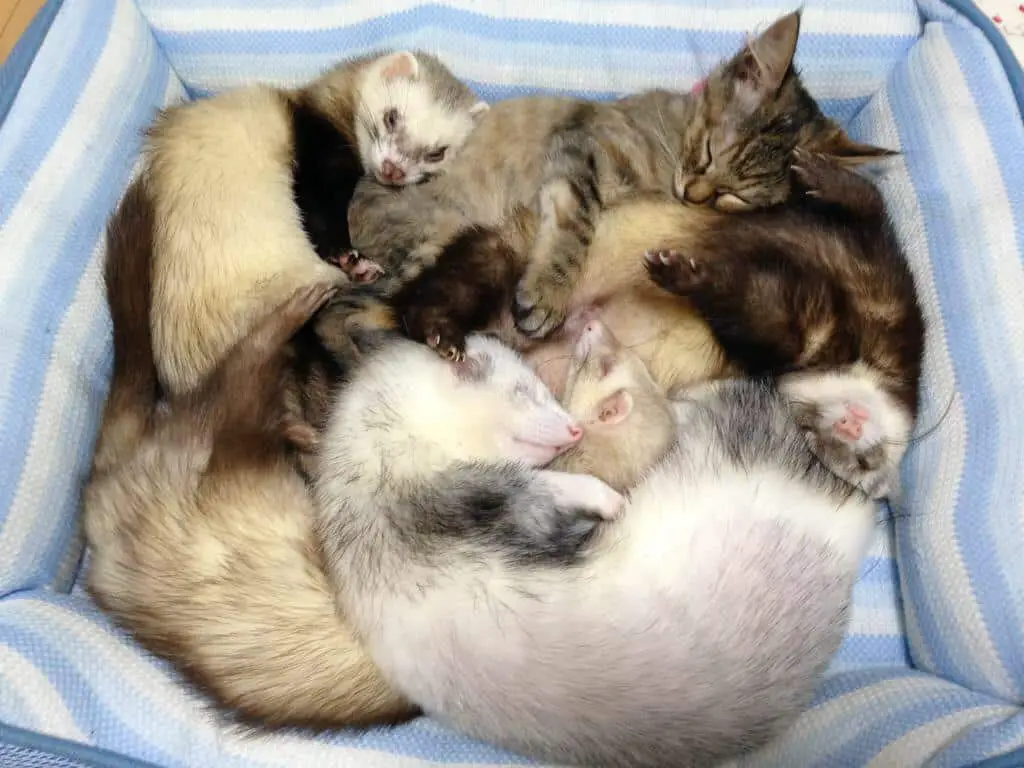
Are cats safe around ferrets?
Cats will often play with ferrets and vice versa. Ferrets can usually hold their own against cats. There are definite exceptions though, so supervise play sessions very closely until you are assured that both your ferret and your cat will be fine (and even then you should be close by to watch over them).
Cats are solitary hunters by nature, and they often have a strong prey drive. They establish territorial boundaries and can be protective of their space. Some cats may be curious about new animals in their environment, while others may be wary or aggressive.
Ferrets are social animals and thrive on interaction with both humans and other ferrets. They are naturally curious and playful, often exploring their surroundings. Ferrets have a tendency to engage in play that may resemble hunting behavior. The safety of cats around ferrets greatly depends on the personalities of the specific animals involved. Some cats and ferrets may get along famously, while others may not tolerate each other’s presence.
Regardless of the initial interactions, it’s crucial to supervise any interactions between cats and ferrets until you are confident that they can coexist peacefully. Training your cat and ferret to respond to commands and establishing boundaries can help prevent conflicts.
Allow the cat and ferret to become acquainted through scent first by swapping bedding or using a barrier that allows them to see and smell each other without direct contact. Gradually increase the level of interaction under close supervision. Ensure that both the cat and ferret have separate areas where they can retreat if they need a break from interaction. Reward both animals for calm and non-aggressive behavior when they are together.
What animals can ferrets live with?
Ferrets can usually coexist peacefully and even amicably with cats and dogs. However, they shouldn’t be allowed free access to smaller companions such as birds or rodents, as they prey on them in nature.
Ferrets are highly social animals, and they often thrive in the company of their own kind. In fact, many ferret owners keep multiple ferrets together as companions. However, introducing ferrets to one another should be done gradually and under supervision to prevent conflicts.
Ferrets can sometimes live harmoniously with dogs, especially if the dog is well-socialized and has a gentle temperament. Smaller dog breeds or dogs that have been raised around other small animals may be more accepting of ferrets as companions. Nevertheless, supervision is essential, especially during the initial introductions.
Ferrets can coexist with cats, but the success of this arrangement depends on the personalities of the individual animals involved. Some cats may be more tolerant and accepting of ferrets, while others may be less so. Early and supervised introductions are key to a safe and peaceful cohabitation.
Ferrets have a strong prey drive, and they are not generally suitable to live with small rodents like hamsters, gerbils, or mice. The natural instincts of ferrets make them a potential threat to these smaller animals.
How close are ferrets to cats?
They are not closely related to other small animals found in pet stores such as rats, mice, hamsters, and guinea pigs. Instead, ferrets are more closely related to predatory animals like dogs and cats (broadly speaking).
Ferrets are known for their playful and curious nature. When introduced to a cat, they can engage in lively and entertaining play sessions. This play can range from gentle wrestling and chasing to hide-and-seek games. Cats, especially younger ones, often enjoy these interactions and may respond in kind.
Ferrets are social animals by nature and are used to living in groups or “businesses.” When given the opportunity, they can form strong bonds not only with their human owners but also with other animals in the household, including cats. Some cats, in turn, may find the presence of a friendly and engaging ferret to be stimulating and even comforting.
Cats are naturally curious creatures, and many are willing to investigate and tolerate the presence of a new addition to the household, including a ferret. Younger cats or cats that have been raised around other animals may be more accepting and adaptable to the presence of a ferret.
While ferrets and cats can form close bonds, it’s crucial to remember that they have different temperaments and instincts. Ferrets may playfully nip or pounce, which could be interpreted as aggression by a cat. Therefore, close supervision during their interactions is essential, especially during the initial stages of introduction.
Are ferrets cuddly?
Ferrets may be tiny, but they pack big personalities into small packages. These guys can be extremely loving and cuddly with their humans. Of course, it takes time to form that special friendship.
Ferrets are undeniably social animals. In the wild, they live in groups, known as “businesses,” and this social nature extends to their interactions with humans. Ferrets thrive on companionship, both with their own kind and with their human caregivers. They enjoy being part of the family and often seek out social interaction.
Ferrets are renowned for their playful and curious nature. They are inquisitive creatures, and their curiosity often leads them to explore their surroundings and engage in amusing antics. This playfulness can translate into cuddly behavior, as ferrets may climb into your lap, nestle against you, or engage in playful nuzzling.
Many ferret owners report moments of affection and cuddliness with their pets. Ferrets may enjoy snuggling, particularly when they’re tired or seeking warmth. Some ferrets will happily curl up with their owners for a nap or for some quality bonding time.
It’s important to recognize that the level of cuddliness in ferrets can vary significantly from one individual to another. Just like humans, each ferret has its own personality and preferences. Some ferrets may be more naturally inclined to seek physical affection, while others may be more independent or reserved.
Are ferrets destructive pets?
They are known to be incredibly high maintenance pets. Having a ferret as a pet can essentially be like having a toddler. If they are not taken care of properly or provided with enough room to properly habitat with a lot of bedding and enrichment, they can become very destructive.
Ferrets are incredibly playful animals, and their playful antics can sometimes result in perceived destructive behavior. They may “steal” items like socks or small objects and stash them in their hiding spots.
To prevent destructive behavior, ferret owners should “ferret-proof” their homes, much like one would child-proof for a toddler. This involves securing or removing items that might be hazardous or tempting to a ferret, such as electrical cords, toxic plants, and small objects that could be swallowed.
Proper training and supervision are essential when it comes to managing a ferret’s behavior. Ferrets can learn commands and boundaries, and they respond well to positive reinforcement techniques. With consistent training and patience, many destructive tendencies can be redirected or mitigated.
Ferrets require mental and physical stimulation to keep them engaged and prevent boredom, which can lead to destructive behavior. Providing plenty of toys, tunnels, and playtime can help channel their energy into positive activities.
Do ferrets bite hard?
Nibbles and nips are often playful or accidental and usually do not leave a mark on the skin. The deliberate, hard bite, which typically results in a puncture wound, is a much more serious situation. A ferret might bite for many reasons, but most biting behavior falls under one of these two general headings.
Ferrets have sharp teeth and strong jaws, which they use in play and exploration. When ferrets are young, they often engage in playful nipping as a way to interact with their environment and their human caregivers. This nipping is typically gentle and not intended to cause harm.
Ferrets may bite harder if they are scared or feel threatened. This can happen if they are handled roughly, mishandled, or placed in a situation that makes them uncomfortable. In these cases, ferrets may bite defensively as a means of self-defense.
Like puppies and kittens, young ferrets go through a teething phase where they may bite more than usual as their adult teeth come in. This biting can be a bit harder, but it is usually temporary.
Ferrets may also use biting as a form of communication. For example, if a ferret wants to play and is excited, it may nip lightly to get your attention. Similarly, if a ferret is overstimulated during play, it may nip as a way to signal that it needs a break.
What is a ferrets natural enemy?
Predators of the Black Footed Ferret include golden eagles, owls, coyotes, badgers, and bobcats. While it’s normal for small animals to have so many predators, reintroduced ferrets are at a heightened risk because animals raised in captivity typically lack some survival skills.
Birds of Prey: In open grassland or prairie habitats where ferrets are often found, birds of prey such as hawks and eagles can pose a significant threat. These raptors have keen eyesight and can spot ferrets from above, making them vulnerable to aerial attacks.
Foxes: Foxes, particularly larger species like the red fox, may prey on ferrets. Foxes are highly adaptable and can be found in various ecosystems where ferrets are present.
Snakes: In some regions, especially those with prairie dog colonies (a primary food source for ferrets), rattlesnakes and other venomous snakes can pose a threat to both ferrets and their prey.
Other Carnivores: Various other carnivorous mammals, such as badgers and weasels, may occasionally come into contact with ferrets and can pose a threat, especially if they compete for the same food sources.
Why did my ferret bite my cat?
There are a few scenarios you can expect. One of them is that both animals will ignore each other. Knowing the ferret’s curious nature, that is highly unlikely. Most cats tolerate ferrets and most ferrets will try to play with cats by biting their legs, tail, and tummy.
Playfulness: Ferrets are naturally playful and curious animals. They may engage in nipping or playful biting during interactions with other pets, including cats. This behavior is typically not aggressive but rather a form of play. Ferrets may not realize that their bites can be uncomfortable for other animals.
Territorial Behavior: Ferrets can be territorial and may exhibit aggressive behavior, including biting, if they feel that their space or belongings are being encroached upon by other animals, like your cat.
Fear or Stress: If your ferret felt threatened or stressed during an interaction with your cat, it might react defensively by biting. This is a natural response to perceived danger or discomfort.
Teething or Discomfort: Young ferrets, like puppies and kittens, go through teething phases where they may bite more than usual. Additionally, if a ferret is experiencing pain or discomfort due to a health issue, it may react by biting as a way to communicate its distress.
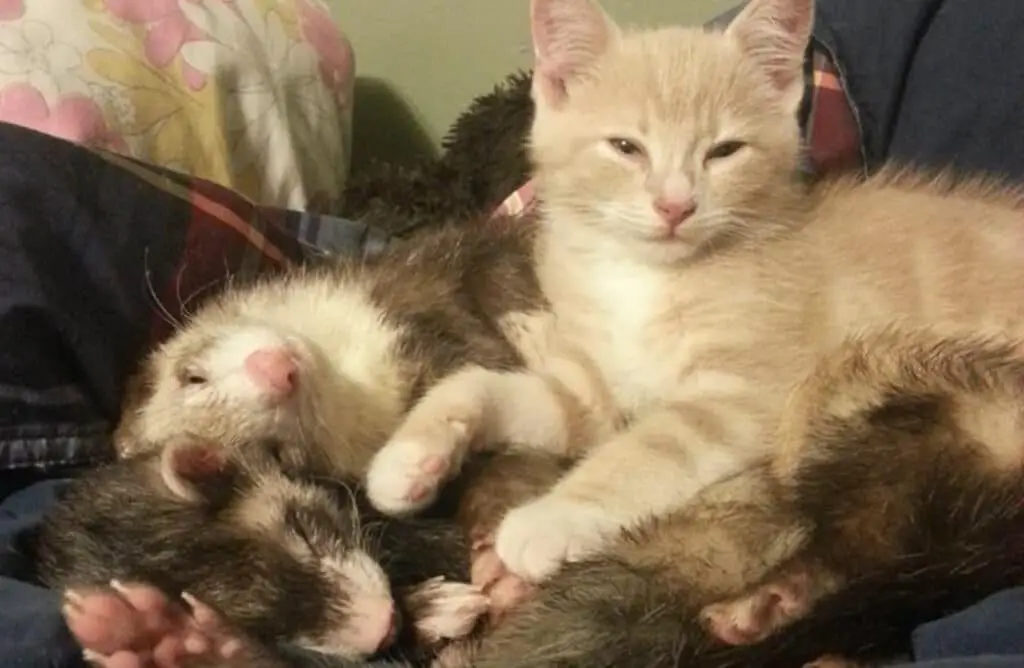
Conclusion
The question of whether ferrets can live with cats is a complex one that ultimately depends on various factors, including the individual personalities and temperaments of the animals involved, as well as the effort and precautions taken by their owners. While ferrets along and cats have distinct differences in behavior and social needs, it is possible for them to coexist peacefully and even develop positive relationships. Successful cohabitation between ferrets and cats often hinges on careful introductions, patient supervision, and consistent training. Understanding the natural instincts and tendencies of both species, such as a cat’s hunting instinct and a ferret’s playful curiosity, can help mitigate potential conflicts.
Ultimately, responsible pet ownership plays a crucial role in ensuring the well-being and safety of both ferrets and cats in a shared living environment. Providing each pet with adequate space, stimulation, and individual attention is essential. While it may require some effort and vigilance, it is possible for ferrets and cats to live together harmoniously, enriching the lives of their human companions and fostering a unique and heartwarming interspecies bond. With the right approach and a commitment to meeting their needs, the coexistence of these charming animals can be a rewarding and joyful experience for everyone involved.
In the end, the compatibility between ferrets and cats is not a one-size-fits-all scenario. It varies from case to case, and some ferret-cat pairs may become fast friends, while others may require more time and management to peacefully coexist. It’s important for pet owners to be patient, observant, and willing to adapt their approach to the unique dynamics of their individual animals. Regular veterinary care, proper nutrition, and a safe living environment are essential aspects of responsible pet ownership, especially when considering the cohabitation of ferrets and cats. This includes vaccinations, flea and parasite control, and spaying or neutering both species to reduce territorial and mating-related behaviors.

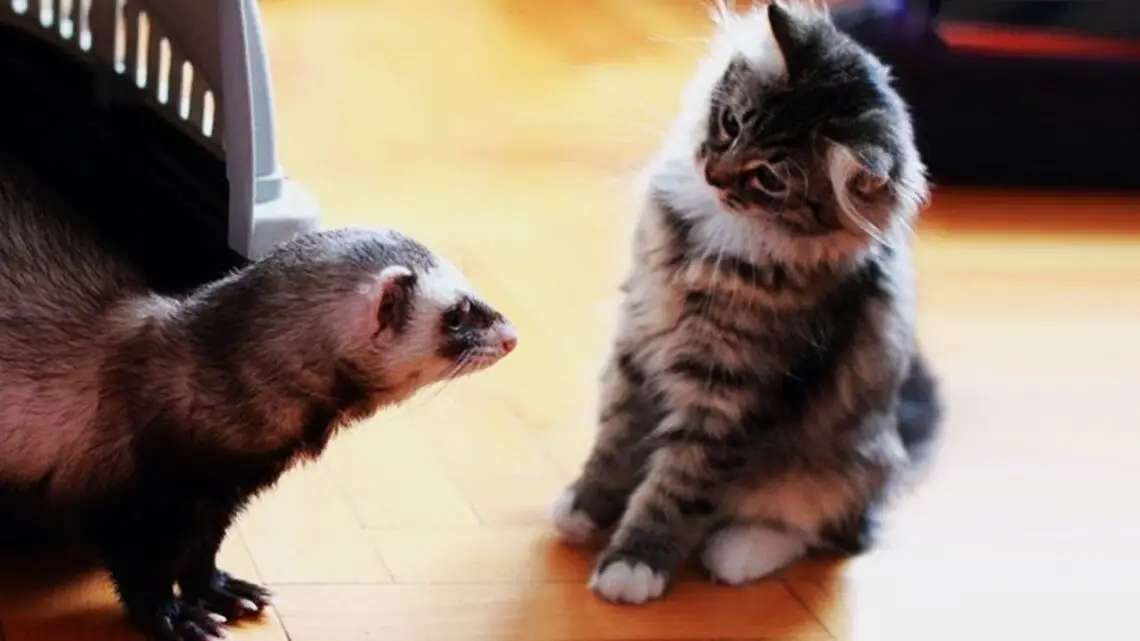
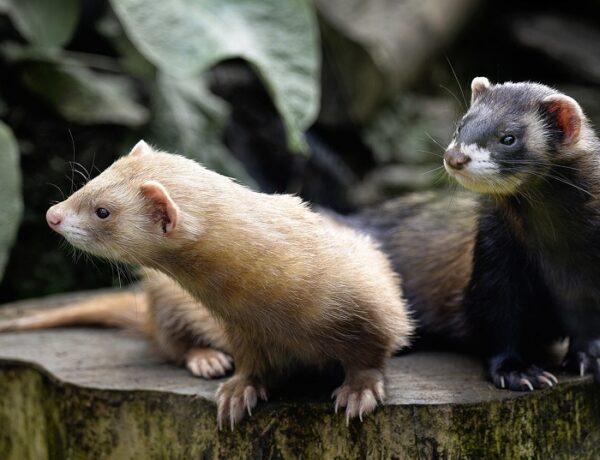
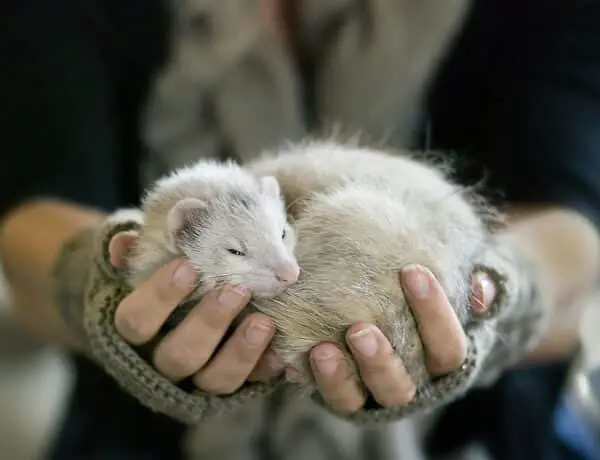
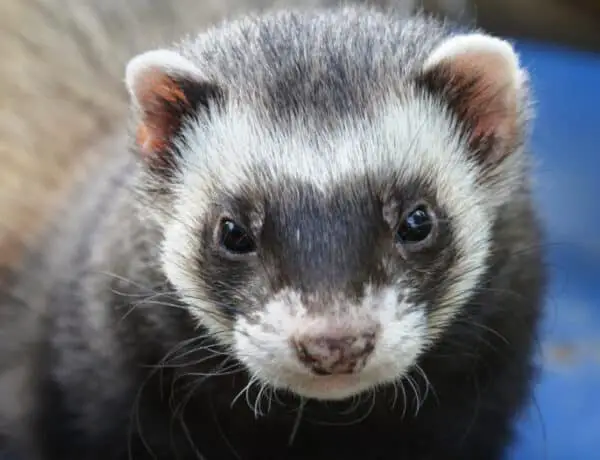
No Comments